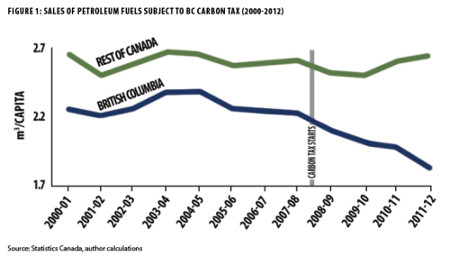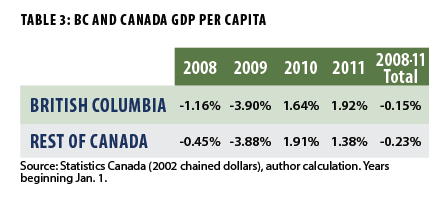 |
| A lake and waterfall in the Niut Range, British Columbia, Canada. Photograph: alamy.com |
Carbon emissions have an unavoidable cost. When we burn fossil fuels and release carbon dioxide into the atmosphere, it increases the greenhouse effect. The resulting climate change has costs, for example by causing more extreme weather. More frequent and intense heat waves and droughts can damage crops, causing food prices to rise, more intense floods can cause more property damage, etc.
Lacking a price attached to carbon emissions in the marketplace, we're effectively putting those costs on a credit card. We may not immediately see the costs, but they keep building up. In fact they're building up with interest, because the costs of climate damage are higher than the costs of reducing greenhouse gas emissions. When we put a price on carbon in the marketplace, consumers can see the costs associated with greenhouse gas emissions and adjust their consumption in an informed manner without continuing to build up that climate credit card debt.
There are several options for pricing carbon emissions, but the alternative with the most support among political conservatives is a revenue-neutral carbon tax. In this system, a fee is attached to fossil fuel products based on their associated carbon emissions, and 100 percent of the revenue is returned to the citizens. People thus have an incentive to reduce emissions such that the revenue they receive is larger than the taxes they pay, allowing them to make money on the system by reducing their impact on the climate.
In 2008, British Columbia implemented a carbon tax, with the revenue returned to citizens through lowered income taxes. A new peer-reviewed study examines the data through 2012 to see how British Columbia's emissions and economy have fared, and the results are impressive. Consumption of taxed fuels per capita has fallen 19 percent in British Columbia relative to the rest of Canada.

As a result, British Columbia's greenhouse gas emissions fell 10 percent between 2008 and 2011, as compared to a 1.1 percent decline for the rest of Canada.
The carbon tax was introduced right before the recession hit in 2008, so while Gross Domestic Product (GDP) fell slightly between 2008 and 2011 in British Columbia, that change was on par with the small decline in Canada's GDP. Thus while it's inconclusive whether the carbon tax is helping or hurting British Columbia's economy, it's certainly not having the seriously damaging economic effect that alarmist opponents claim that carbon taxes will have.

Polls also show that public support for the British Columbia carbon tax has grown to 64 percent, and 59 percent of Canadians say they would support a similar carbon tax system in their provinces. The popularity may be in part a result of the fact that by offsetting the carbon taxes, British Columbia has the lowest income taxes in Canada.
Over its first five years, British Columbia's carbon tax has served as a great example of a way to reduce greenhouse gas emissions by cutting up the climate credit card. They implemented a carbon tax, the economy didn't collapse (or even take notice), and the citizens are happy with the system. The question now is whether other governments like in the USA will follow suit. [Guardian]
No comments:
Post a Comment